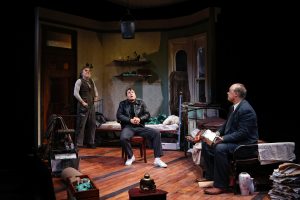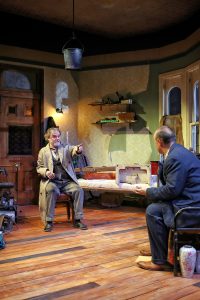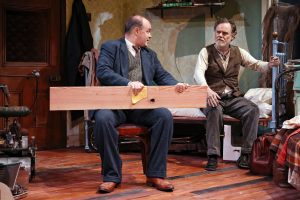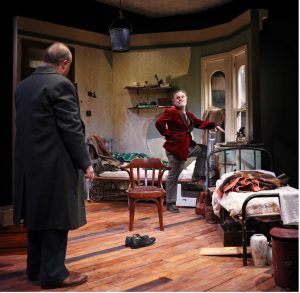By Harold Pinter; Director : Iain Sinclair. Ensemble Theatre; 14 Oct – 19 Nov.
Reviewed : 19 October*

Before I begin, I must say that I am a great fan of Harold Pinter. I love his work. I love his characters. So, I when I saw who was involved in this production, I went to see it with great hope. A strong director. Very experienced actors. An intimate theatre space. I wasn’t disappointed!
Harold Pinter made an indelible, mark on the lives of actors, directors, critics and audiences in theatres, cinemas and English and Drama classrooms. He delved inside the characters he created, giving them a depth that went beyond the printed word and hung in unfinished phrases, unanswered questions and strange, sometimes menacing, relationships.

His stage directions and meticulous descriptions placed his characters clearly in a specific time and place. He gave directors and actors much with which to work. Perhaps none of his many plays shows this quite so vividly as The Caretaker.
Director Iain Sinclair says in his program notes: “It’s the director’s job to help actors best implement a playwright’s dramatic code and Harold Pinter’s is the best. We have followed it to the letter”.
Pinter’s “dramatic code” includes the setting and designer Veronique Benett’s has deciphered it in fastidious detail. A small room in an empty dilapidated house is crowded with two beds and a collection of miscellaneous paraphernalia including overflowing boxes, drawers, old kitchen appliances, an ancient lawn mower and a rolled- up strip of carpet. A mouse trap sits innocuously on one corner of the stage.
Two suitcases and pieces of wood are stacked under one bed. An old bathroom basin lies on the other. A chair is overturned on the floor. The window is dingy. A china Buddha sits on top of a gas stove. A bucket hangs from the ceiling. The atmosphere is seedy, lonely, fusty, augmented by Matt Cox’s moody lighting and Daryl Wallis’ ominous, lonely sound design.

Into this crowded, disconcerting space, Sinclair brings a distinguished cast. Darren Gilshenan as the garrulous tramp, Davies, Anthony Gooley as the shy, vulnerable Aston, and Henry Nixon as his more confident, intimidating brother, Mick.
Sinclair says, “It has been a lifelong dream to work on this particular play with actors of the calibre of Darren, Anthony and Henry” and he certainly works with them punctiliously in this fine, carefully controlled, beautifully timed production.
Director and actors have honoured Pinter’s “dramatic code”, respecting every possible implication in the dialogue and every implicit suggestion in every pause. On the intimate Ensemble stage, the characters they have uncovered are real and close, hovering hauntingly at the edge of the fourth wall.

Darren Gilshenan’s Davies is restlessly twitchy, edgy, always watchful. His eyes move nervously, canvassing the space cautiously. Never really at ease and never really relaxed, he is constantly aware and cannily observant. This Davies has learnt from experience and puts it to good measure as he cunningly plays the brothers against each other. Gilshenan brings his wide experience, creative intelligence and immaculate timing into creating a canny, crafty Davies who wears his torn coat, holey socks and soiled underclothes with a sort of swaggering pride.
Anthony Gooley finds a hovering frailty in Aston. It’s there in sad his eyes as they stare beyond the room into things neither Davies nor his brother see. It’s there in a wistful turn of his head, or in the hesitant way he hands Davies a pair of shoes. It’s there in his halting, bleak description of undergoing electric shock therapy – and in the despair it has left behind. Gooley makes that quiet, despair a pervading influence on the Aston he portrays. Its appeal is unnerving.

Henry Nixon, as Mick, introduces Pinter’s ability to nonplus the audience in the first few moments of the play. He enters the desolate room, sits on the bed and stares long and menacingly at the audience. Then leaves. He does not reappear until late in the second scene, where he surprises and tries, successfully at first, to intimidate Davies. Nixon sustains the menace of this Mick with a stiff poise that infuses every gesture and intonation. He holds himself tightly, ready to spring – a total contrast to his quiet, submissive brother.
Veronique Benett follows Pinter’s detailed description of the way his characters are dressed, showing the contrast between these three men who are struggling to find a way to survive in seedy, 1960s London. Aston wears a shirt, tie, jumper and coat, hiding his nerves in shabby respectability. Mick wears turned up blue jeans, a leather jacket, white canvas shoes, brazenly trying to be modern, upbeat. Davies wears the clothes of a down-and-out, but does so with a sort of insolent swagger.

Inside these disguises, Gilshenan, Gooley and Nixon bring their characters to life. With Sinclair they develop the strange trio and their even stranger relationship. They find the drama, the absurdity … and the tension that can be built into a comedic three-way game of ‘pig in the middle’ with a shabby leather bag.
Three men, three portraits, three intriguing characters inter-relating in a production that is totally perplexing, totally mesmerizing … totally Pinteresque.
*Opening performance